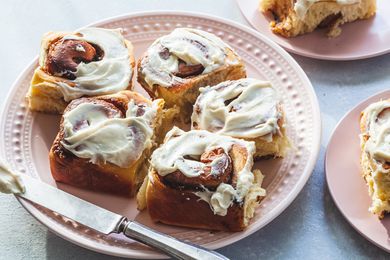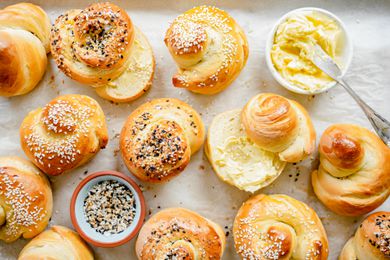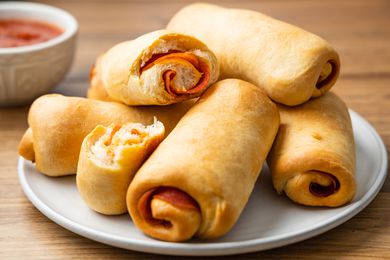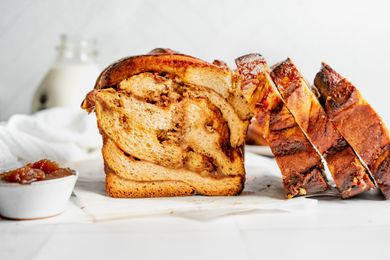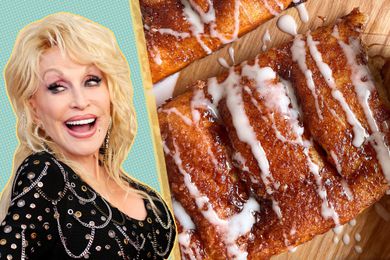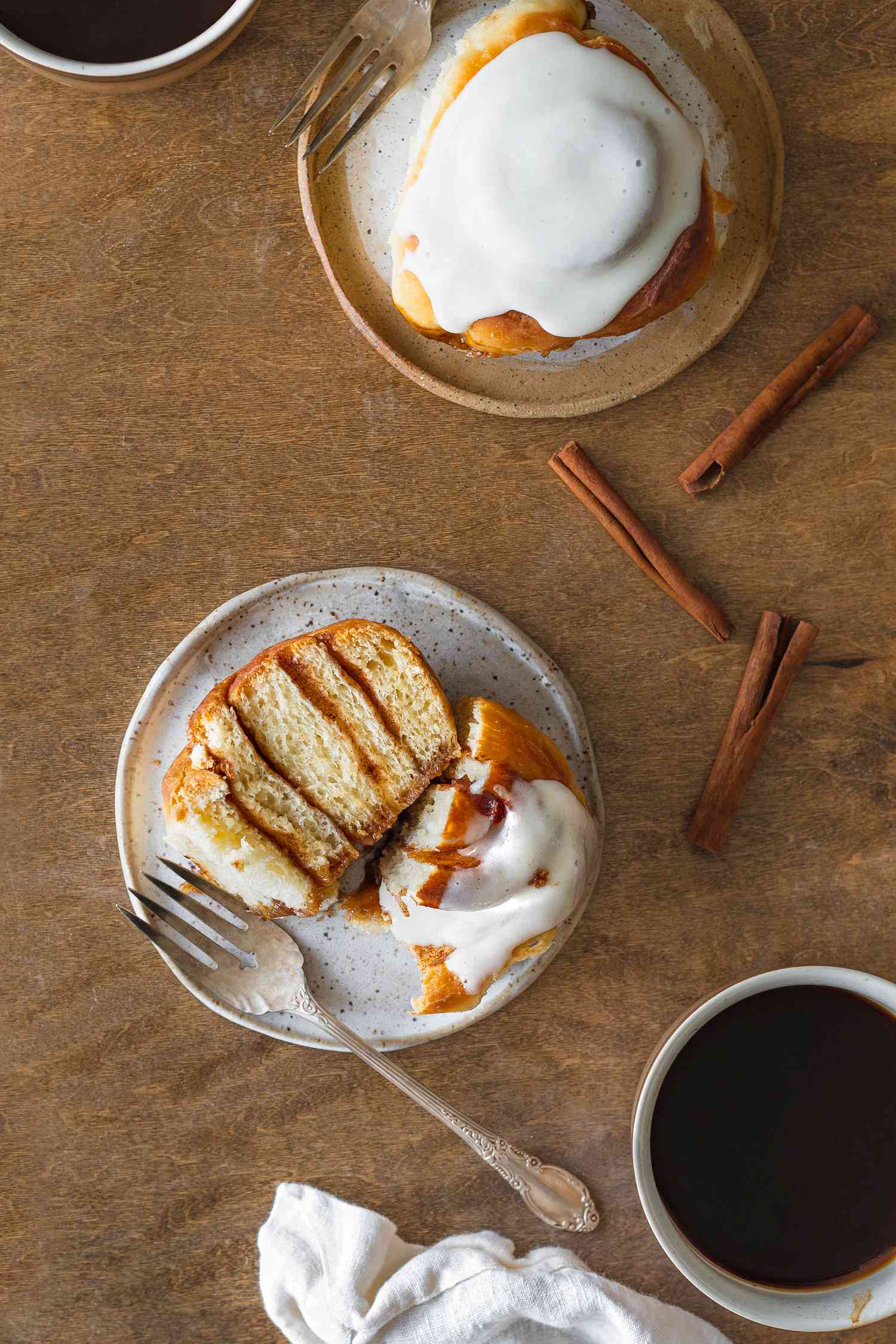
Simply Recipes / Hannah Dela Cruz
There’s nothing quite like a soft, fluffy cinnamon roll. Especially if it’s a sourdough cinnamon roll! The slight sour edge of the starter is the perfect complement to the sugary cinnamon filling and cream cheese frosting.
This cinnamon roll recipe combines the best of both worlds: the predictable convenience of fast-acting yeast with the deep nuanced flavors in sourdough. Sourdough starter contributes the inherent tang of fermentation, while commercial yeast allows the dough to rise quickly so your cinnamon rolls won’t be too sour, resulting in cinnamon rolls with a balanced flavor.
Since you’ll be using commercial yeast, you can make this recipe all in one day and it comes together in less than 3 hours.
What Is Sourdough Discard?
Sourdough starter is a mixture of flour and water that harvests naturally occurring yeasts from the environment. When allowed to ferment, the bubbly starter makes bread rise without commercial yeast. Sourdough starter ferments dough very slowly, allowing the resulting bread to develop deeper flavors that aren’t always possible from using active dry or instant yeast.
Starters are living things and have to be fed on a regular basis, so sourdough enthusiasts often end up with a lot of sourdough discard—i.e. excess starter that’s “discarded” because it is not strong enough to make bread rise on its own.
Rather than actually discarding it, you can put it to use in baked goods. It adds a boost to the rise of doughs containing commercial yeast (like this one), and contributes tons of flavor.
:max_bytes(150000):strip_icc()/Simply-Recipes-Sourdough-Cinnamon-LEAD-05-52bc7da3d1134bdd9508ccc66b083cda.jpg)
Simply Recipes / Hannah Dela Cruz
A Secret to Soft and Fluffy Cinnamon Rolls
The unexpected addition of another pantry staple guarantees that these rolls bake up soft and fluffy: cornstarch. When mixed with all-purpose flour, a little cornstarch lowers the protein content of the dough slightly while still encouraging a good rise. This results in cinnamon rolls that have a really tender and airy texture.
Make Ahead and Rise Overnight
You can make your dough up to 24 hours ahead of time and let it bulk ferment in the refrigerator. Alternatively, you can shape your rolls the night before, refrigerate them, and bake them in the morning for a warm, irresistible breakfast treat.
Swaps and Substitutions
This recipe is also endlessly adaptable. Get creative!
- Fancy up the filling: Add nuts, dried fruit, or diced apples to your cinnamon filling. You can even add other spices, such as cloves, nutmeg, ginger, or allspice.
- Riff on the frosting: I love changing up my glaze by adding apple cider, maple syrup or a little bit of runny honey.
:max_bytes(150000):strip_icc()/Simply-Recipes-Sourdough-Cinnamon-LEAD-06-3aff4f3f2b8146e0aca12804cfe87122.jpg)
Simply Recipes / Hannah Dela Cruz
Dreams of Cinnamon Swirls
Sourdough Cinnamon Rolls
This recipe requires sourdough starter discard. If you are new to sourdough starter making, here is a comprehensive guide to get you started.
I developed this recipe so you can make it entirely by hand, but you can definitely use a stand mixer instead.
Ingredients
For the dough
-
1 1/4 cup (282g) whole milk
-
1/3 cup (75g) sugar
-
2 large eggs
-
1/2 cup (113g) sourdough discard
-
2 1/4 teaspoons (7g) active dry yeast
-
4 1/2 cups (540g) all-purpose flour
-
1/4 cup (30g) cornstarch
-
1 teaspoon (6g) kosher salt
-
8 tablespoons (113g) unsalted butter, softened
For the filling
-
1 cup (170g) brown sugar
-
1/2 cup (113g) granulated sugar
-
1 tablespoon (10g) ground cinnamon
-
1/2 teaspoon (4g) kosher salt
-
4 tablespoons (56g) unsalted butter, softened
For the frosting
-
3.5 ounces/100g (7 tablespoons) cream cheese, softened
-
1/2 cup (65g) powdered sugar
-
1 tablespoon (14g) unsalted butter, softened
-
2 tablespoons (28g) whole milk
Method
-
Warm the milk:
In a small saucepan over medium low heat, warm the milk until it reaches 170°F or tiny bubbles start to appear on the edges and a skin forms on the surface. Transfer the milk to a large liquid measuring cup and let it cool slightly.
-
Add the sugar, eggs, and discard to the milk, then the yeast:
Add the sugar, eggs, and sourdough discard to the milk in the measuring cup. Lightly whisk to mix the ingredients together. Make sure the mixture is cool to the touch (cooler than 120°F; any warmer and it may harm your yeast). Stir the yeast into the milk mixture and set aside for 10 minutes. The mixture should look bubbly and smell sweet and yeasty.
-
Combine the dry ingredients:
In a large bowl, whisk together the flour, cornstarch, and salt. Create a well in the center of your flour mixture and pour the milk mixture into the middle. Stir everything together using your hands or a spatula until you end up with a sticky, lumpy dough (don’t worry, the lumps are totally normal).
-
Knead the butter into the dough:
Once your dough begins to form a cohesive mass, knead the 8 tablespoons of softened butter into the dough 1 tablespoon at a time. The dough will look oily after each addition, but will start to look smoother and feel less sticky after the butter is properly incorporated. Wait to add more butter until each portion is fully incorporated, or when your dough no longer feels greasy. Your dough will be soft and supple after all the butter is incorporated, but may still feel sticky.
-
Rest the dough:
Round the dough into a tight ball and place it inside a lightly oiled large bowl. Cover the bowl with plastic wrap and let it rest for 10 minutes. This will allow the flour to fully hydrate and make the dough less sticky and easier to work with.
-
Knead the dough again:
Turn the dough out onto a clean work surface. Set the bowl aside for later use.
Tip
For the most tender rolls, flour your work surface minimally, if at all.
Knead the dough until it looks completely smooth, about 5 minutes. Round the dough into a tight ball and return it to the bowl. Cover the dough with plastic wrap.
-
Proof the dough:
Let the dough rise in a warm place until it’s doubled in size, 45 minutes to 1 hour. Timing might vary depending on the activity of your yeast and the warmth of your kitchen.
-
Make the cinnamon sugar filling:
In a medium bowl, use a whisk to combine the brown sugar, granulated sugar, cinnamon, and salt. Set aside until your dough is ready to be shaped.
-
Shape the rolls:
Turn your dough out on a lightly floured work surface. Using a rolling pin, flatten the dough out into a 24x10-inch rectangle, about 1/4 inch thick.
-
Spread butter and filling on the dough:
With an offset spatula, spread an even layer of 4 tablespoons of softened butter on top of your dough. Sprinkle the cinnamon sugar filling on top of your dough, leaving a 1-inch margin all around the border. Pat the filling on the dough to help it adhere.
![Sourdough Discard Cinnamon Roll Dough Stretched on a Counter Top and Covered with Butter]()
Simply Recipes / Hannah Dela Cruz
-
Roll up the dough:
Working with the longer side of your dough, roll it into a tight cylinder. Pinch the edge of your dough to seal the filling in.
![Cinnamon Sugar Filling Added to Sourdough Discard Cinnamon Rolls Dough and Rolled]()
Simply Recipes / Hannah Dela Cruz
![Cinnamon Roll Edges Pinched Together to Seal]()
Simply Recipes / Hannah Dela Cruz
-
Cut the rolls:
Using a serrated knife, cut the dough into 12 (2-inch) portions. Arrange the rolls in a 9x13-inch baking pan lined with parchment paper
![Sourdough Discard Cinnamon Roll Dough Log Cut into Individual Rolls]()
Simply Recipes / Hannah Dela Cruz
![Sourdough Discard Cinnamon Rolls Resting in a Casserole Dish]()
Simply Recipes / Hannah Dela Cruz
-
Preheat your oven:
Preheat your oven to 375°F.
-
Let the rolls rise:
Cover your pan with plastic wrap and allow your rolls to rise untouched for 30 to 45 minutes, or until your rolls look puffy and are beginning to touch each other.
![Sourdough Discard Cinnamon Rolls after Proofing]()
Simply Recipes / Hannah Dela Cruz
-
Bake the rolls:
Bake the rolls for 40 to 45 minutes, until they are golden brown. When probed with an instant-read thermometer, the thermometer should read 195°F.
-
Make the frosting:
While your rolls are baking, beat the cream cheese and powdered sugar together with a hand mixer. Once the mixture is smooth and aerated, add the butter and milk and continue beating until smooth, with no lumps remaining. Set aside until ready to use.
-
Frost and Serve:
When you take your rolls out of the oven, spread an even layer of frosting on top.
These rolls are best enjoyed the day they are baked, but will keep well in an airtight container at room temperature for up to 3 days. The refrigerator tends to dry out bread, so it’s best to avoid refrigerating these rolls.
Did you love the recipe? Leave us stars below!
![Sourdough Discard Cinnamon Rolls in a Casserole Dish with Some Glazed with Cream Cheese Frosting]()
Simply Recipes / Hannah Dela Cruz
| Nutrition Facts (per serving) | |
|---|---|
| 495 | Calories |
| 17g | Fat |
| 78g | Carbs |
| 8g | Protein |
| Nutrition Facts | |
|---|---|
| Servings: 12 | |
| Amount per serving | |
| Calories | 495 |
| % Daily Value* | |
| Total Fat 17g | 22% |
| Saturated Fat 10g | 51% |
| Cholesterol 75mg | 25% |
| Sodium 303mg | 13% |
| Total Carbohydrate 78g | 28% |
| Dietary Fiber 2g | 7% |
| Total Sugars 36g | |
| Protein 8g | |
| Vitamin C 0mg | 0% |
| Calcium 73mg | 6% |
| Iron 3mg | 15% |
| Potassium 146mg | 3% |
| *The % Daily Value (DV) tells you how much a nutrient in a food serving contributes to a daily diet. 2,000 calories a day is used for general nutrition advice. | |

:max_bytes(150000):strip_icc()/Simply-Recipes-Sourdough-Cinnamon-Rolls-METHOD-01-6886e7a11d564bc1a3330f31a8bb1c55.jpg)
:max_bytes(150000):strip_icc()/Simply-Recipes-Sourdough-Cinnamon-Rolls-METHOD-02-ffcf000a04214f4fad8b1d041600a6ec.jpg)
:max_bytes(150000):strip_icc()/Simply-Recipes-Sourdough-Cinnamon-Rolls-METHOD-03-ad538e6fa4dc4d52a335cc0f9b9f2f02.jpg)
:max_bytes(150000):strip_icc()/Simply-Recipes-Sourdough-Cinnamon-Rolls-METHOD-04-e99aea3b9cdd4ed1abdb1ff322aa77f3.jpg)
:max_bytes(150000):strip_icc()/Simply-Recipes-Sourdough-Cinnamon-Rolls-METHOD-05-00eb984687e746fdab0c4e7187f15ed0.jpg)
:max_bytes(150000):strip_icc()/Simply-Recipes-Sourdough-Cinnamon-Rolls-METHOD-06-021407eace6140989a0a9712c12710b8.jpg)
:max_bytes(150000):strip_icc()/Simply-Recipes-Sourdough-Cinnamon-LEAD-07-88a49a2c6a934cd08595e32e79a691e7.jpg)
